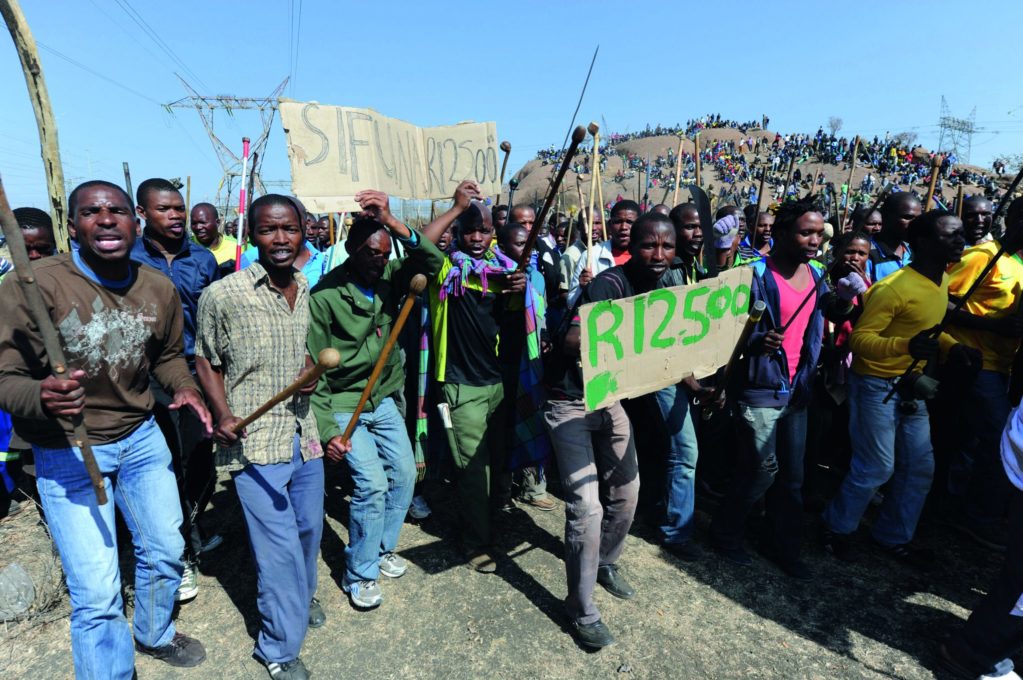The hard boiled trade unionist sat and wept before journalists as he told of his last attempt to save some of the 44 lives—including two police officers, lost in a violent and bloody week at one of South Africa’s biggest and most troubled platinum mines.
For a week in August more than 3,000 workers protested on top of Wonderkop Hill around two kilometers from the gates of Marikana Mine, in Rustenburg 122km north west of Johannesburg. Almost the entire workforce of 30,000 people downed tools in support of more pay for the rock drillers, who carry out the hardest and most dangerous work for the least pay.
The president of the Association of Mineworkers and Construction Union (AMCU), Joseph Mathunjwa, recalled the last few minutes before angry strikers rushed the police.
“Please leave this place; they are going to kill you… I kneeled there, I tried to plead with them… They said to me they think it’s safe to be on the mountain. ‘If we have to be killed let the police come and kill us… We want money that can keep our families going’ [they said],” Mathunjwa says.
Mineworkers in North West’s Lonmin Platinum mine began striking on August 10 for salary increases from an estimated R4,500 ($540) to R12,500 ($1,500). Many have blamed rivalry between AMCU and the biggest trade union, the National Union of Mineworkers (NUM), for the tension that led to the fatal shooting.
Loading...
AMCU denies this. It says the union was asked to intervene on August 13 and was merely doing its job.
“I never thought that the history of the Sharpeville massacre would happen in 2012, in a democratic society,” said Mathunjwa.
AMCU voiced their frustrations with their organization being wrongfully charged as orchestrating the massacre. Mathunjwa argued that they were a recognized union in some sections at Lonmin and had a membership of 7,000.
“Why involve violence now?”
Eddie Majadibodu, the head of bargaining for the NUM, saw the shootings and how police dispersed strikers in the aftermath on the following day to prevent more violence.
“The NUM wants a full public inquiry to determine exactly what happened,” he says.
It is one of the few issues upon which both unions agree.
The ministry of police spokesperson, Zweli Mnisi, says the matter has been a brewing labor issue, employee versus employer. The police were called in to retain order as the constitution does not call for barbaric behavior, he said. Two police officers were killed on the first day that violence struck, he says that the workers were in possession of illegal arms are and dared the cops saying: “You dare us, we won’t move. If you want war, we’ll give you war.”
“From our side it’s not the duty of the police to be labor brokers,” he says.
Police confirmed that 44 people had died on the night of August 16 when police first used water cannon and then bullets to stop a rushing crowd.
“The [Independent Police Investigative Directorate] IPID, who police the police, are onsite to determine who fired the first shot,” he says.
Lonmin chairman, Roger Phillimore, said: “We are treating the developments around police operations this afternoon [August 17] with the utmost seriousness. The South African Police Service (SAPS) have been in charge of public order and safety on the ground since the violence between competing labor factions erupted over the weekend, claiming the lives of eight of our employees and two police officers. It goes without saying that we deeply regret the further loss of life in what is clearly a public order rather than labor relations associated matter.”
Workers at Marikana risked dismissal by ignoring an ultimatum from Lonmin, the world’s third largest platinum producer, to return to work by August 17. President Jacob Zuma cut short a regional SADC conference, held in Maputo, Mozambique, to return home so he could visit Marikana.
As the sun went down on the day after the killings a group of women gathered around Wonderkop Hill and wept for their lost men.
“You have stolen our husbands, you have stolen our brothers,” shouted one distraught woman at police.
Only an inquiry will tell us how this happened.
Loading...
